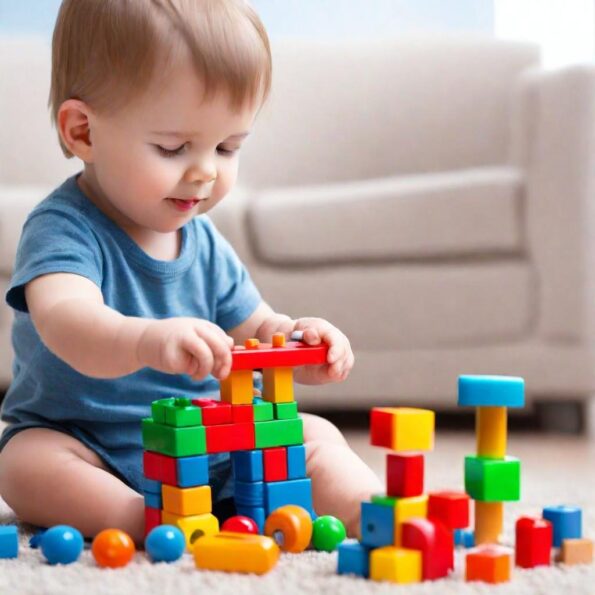This article deals with the fascinating relationship between toys and brain development, examining how toys influence children’s cognitive, emotional, and social development.



Did you know that toys or play can be the most important interaction for your kid’s brain development?
The early years of a child’s life are incredibly significant, as the variety of experiences they encounter and the relationships they form with important individuals directly influence their brain development. This early foundation shapes all aspects of learning, behavior, physical health, and mental well-being, leaving lasting effects that endure throughout their lifetime. For very young children, play serves as the primary avenue for learning and exploration. Through play, children engage in the process of discovery, attempting to make sense of the world around them and develop a sense of mastery over their environment. Much of this learning occurs within a safe and nurturing environment that encourages exploration and curiosity.
Toys are not just playthings; they are powerful tools that play a crucial role in developing a child’s brain. From building blocks to puzzles, and dolls to science kits, toys provide a wide range of stimulating experiences that contribute to brain development in children. Brain development toys play a crucial role in shaping children’s cognitive, emotional, and social development. These toys offer a multitude of benefits that contribute to children’s growth and learning in various ways. In this article, we delve into the diverse advantages of brain development toys and their importance in promoting holistic development in children.
How toys help brain development
Toys stimulate various cognitive skills in children, including problem-solving, critical thinking, and spatial awareness. For example, building blocks and puzzles require children to manipulate objects, solve problems, and experiment with cause and effect, thereby enhancing their problem-solving abilities. By engaging in these activities, children develop essential cognitive skills that lay the foundation for academic success and lifelong learning. Moreover, toys that promote imaginative play, such as dolls and action figures, stimulate creativity and imagination in children. Imaginative play allows children to explore different roles, scenarios, and narratives, fostering creativity and divergent thinking. As children engage in pretend play, they develop the ability to think outside the box and come up with innovative solutions to problems, thereby enhancing their creative thinking skills.
cognitive abilities
Brain development toys are instrumental in enhancing children’s cognitive abilities, including memory, attention, and problem-solving. Engaging in creative play with toys stimulates imagination and critical thinking skills. Furthermore, toys that require children to solve puzzles or engage in imaginative scenarios foster the development of cognitive skills such as creativity and problem-solving. Toys play a vital role in language development in children. Board games, storybooks, and educational toys often incorporate words, letters, and numbers, introducing and reinforcing language skills in a fun and engaging way. Through play with these toys, children expand their vocabulary, improve reading comprehension, and enhance their communication abilities. Furthermore, toys that encourage social interaction, such as collaborative construction sets, promote language development by fostering communication, sharing, and cooperation among children.
emotional and social development
Toys also contribute to emotional and social development in children. Through play with these toys, children learn to identify and express their feelings, understand the emotions of others, and develop empathy and compassion. Additionally, toys that promote social interaction, such as board games and team-building toys, foster important social skills like turn-taking, negotiation, and teamwork, thereby enhancing children’s social competence and emotional intelligence. Toys play a crucial role in the development of fine and gross motor skills in children. Building sets, art supplies, and puzzles require precise hand-eye coordination and dexterity, thereby improving fine motor skills. Physical toys like balls, bikes, and scooters encourage gross motor skills, balance, and coordination, supporting the development of fine and gross motor skills. Through play with these toys, children develop the physical skills necessary for everyday activities and physical fitness.
physical activity
Many brain development toys involve physical activity, which aids in the improvement of both gross and fine motor skills in children. Toys that necessitate hand-eye coordination, such as building blocks or puzzles, contribute to the refinement of motor skills. These physical activities not only enhance motor skills but also promote overall physical development in children. Certain brain development toys, such as board games or role-playing games, encourage socialization and collaboration among children. Engaging in cooperative play fosters essential social skills like communication, empathy, and teamwork. Through interaction with peers during playtime, children learn valuable social skills that are essential for navigating social interactions in various contexts.
skills with brain development
Completing challenging tasks or mastering new skills with brain development toys can significantly boost children’s confidence and self-esteem. This sense of accomplishment nurtures a positive self-image and instills a belief in one’s abilities. As children tackle new challenges and overcome obstacles with toys, they develop resilience and confidence in their problem-solving abilities. Many brain development toys are designed with educational value in mind, offering opportunities for children to learn about various subjects such as science, math, or language. These toys facilitate experiential learning and instill a love for learning from a young age. By engaging with educational toys, children develop a thirst for knowledge and acquire foundational skills crucial for academic success.
In conclusion, toys play a significant role in brain development in children, influencing cognitive, emotional, social, and motor development. By providing stimulating experiences that engage children’s minds and bodies, toys contribute to the overall growth and well-being of children. As parents and educators, it is essential to recognize the importance of toys in children’s development and provide them with a variety of toys that support their cognitive, emotional, and social needs. By fostering a playful and enriching environment, we can help children reach their full potential and thrive in all aspects of life. Brain development toys offer a plethora of benefits that contribute to children’s overall growth and development. From enhancing cognitive and motor skills to fostering socialization and boosting confidence, these toys play a pivotal role in shaping children’s lives. By providing children with access to a diverse range of brain development toys, parents and caregivers can nurture their children’s intellectual, emotional, and social well-being. As champions of children’s development, it is essential to recognize the importance of brain development toys and their profound impact on shaping the future generation.
